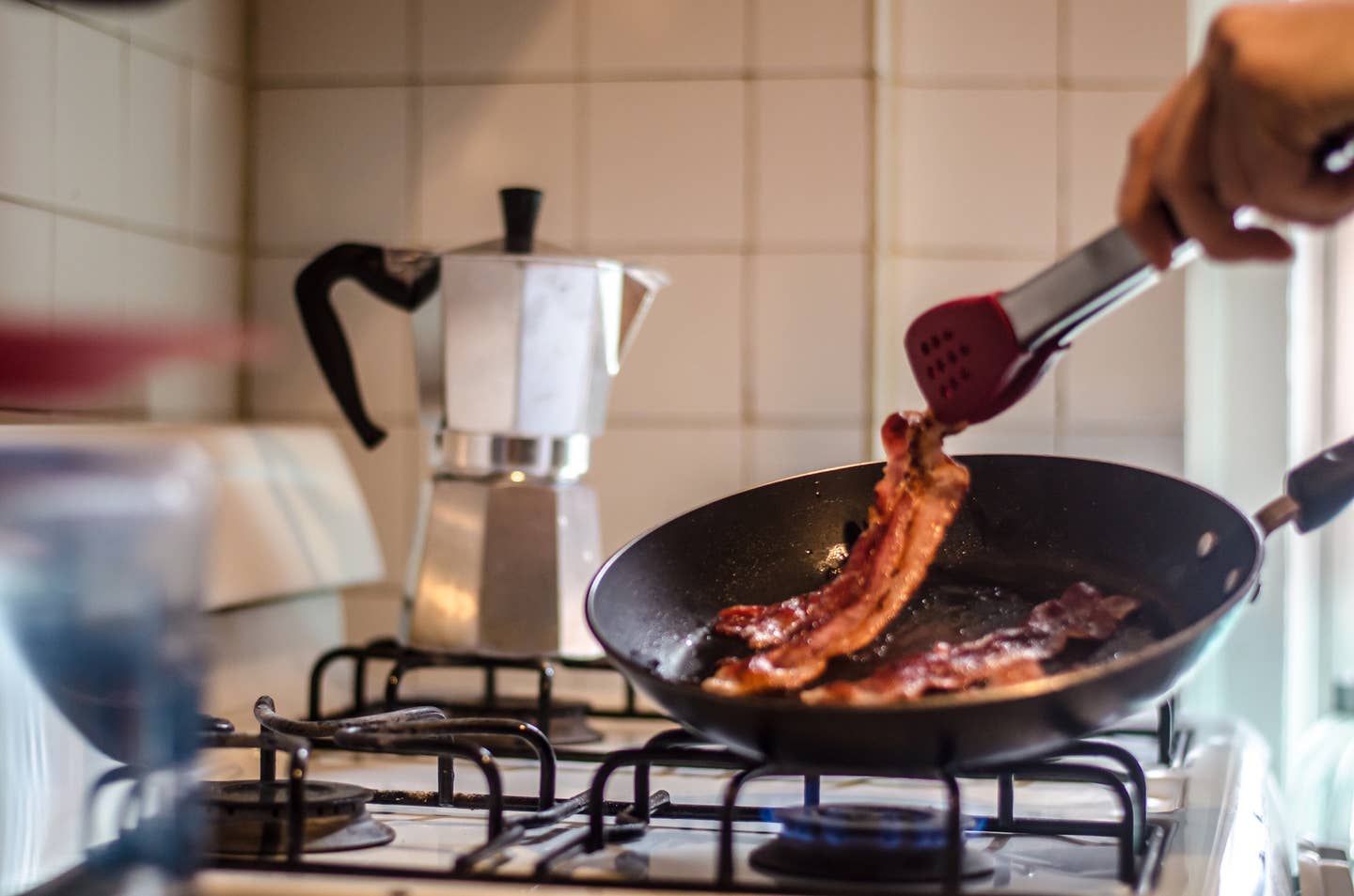
How to Save Money on Groceries. Bring This List to the Store
With the announcement that Tyson is raising meat prices 30 percent for beef and 38 percent for pork due to labor shortages, and the cost of other packaged foods is going up as well, shoppers are looking for ways to save money. Luckily there is an answer. A new study from Oxford University found that you can actually save 30 percent by eating a vegan diet, and other recent reports found that it's possible to save as much as $1,260 at the store per year by ditching meat and dairy and eating more a plant-based diet.
But how, exactly? What should you buy at the market? The myth persists that plant-based foods can be expensive — why do you think they call Whole Foods "whole paycheck," after all— but eating plant-based or vegan at least some of the time does not have to be pricy.
Yet another study in 2020 found that going meatless can save an average of $23 per week on groceries. Processed foods, like chips, cookies, and bread, can cost more than buying produce, like vegetables, fruit, legumes, as well as whole grains, nuts, and seeds, which are not only better for you and the planet but bring down the cost of your meals to under $10 per serving.
But where do you get your protein?
Plant-based sources of proteins include legumes – beans, peas, soybeans and lentils – and also tofu, seitan, and tempeh all have plenty of protein and can make up for not eating meat. Most Americans actually get more protein than they need in a day, which is .8 grams per kilogram (g/kg) of body weight. Some experts, however, recommend slightly higher amounts for plant-based diets, and people who are extremely active.
So you can aim for 9. to 1 gram of protein per kilogram of body weight, Fitness enthusiasts may also need more, closer to 1.2 to 1.4 grams per kilogram of body weight, which translates to 45 to 55 grams for a woman and 55 to 70 grams of protein per day for a man, but these numbers depend on an individual's activity level, size, age, and weight.
It's easy to get this amount of protein from a plant-based diet since just starting your day with a bowl of oatmeal is 5 grams. Add lentils and beans into your quinoa salad at lunch and you are well on your way. Meanwhile, a whole food diet is much healthier for you since unprocessed plant-based foods contain vitamins and minerals, that are powerful immune boosters, as well as fiber, calcium, and other vital nutrients – while being very low in fat.
Healthy plant-based foods also do not contain cholesterol — plants never do — so a diet rich in plant-based foods can help reduce cholesterol and even fight heart disease, including lowering your risk of stroke, cancer, hypertension, obesity, diabetes, and other deadly diseases. Plant-based diets literally save lives while saving you money.
Plant-based diets save money on healthcare
These and other healthy foods are inexpensive, especially when bought in bulk, in season, on sale, and at discount stores or farmer's markets in season. If you can grow any food or herbs, or otherwise get them for free, all the better!
One of the best sites for how to save money on each meal and serving is Broke Bank Vegan, founded by Mitch and Justine, two registered nurses who quit their jobs, sold all of their belongings, and moved to Mexico where they love to cook Mexican food with a vegan twist. Their recipes include nutritional information and how much each serving will cost you. The Beet offers hundreds of plant-based or vegan recipes that make it easy and delicious to eat vegan, save money and satisfy everyone at your table: 5 Affordable Protein-Packed Plant-Based Dinners to Cook Now.
“The key to eating vegan on a budget is simple”, according to Melissa from The Stingy Vegan, just “eat whole foods that are in season, cook at home when you can and take the time for a little bit of planning.”
If all Americans switched to vegetarianism, it would reduce health care costs by up to $223.6 billion each year according to a prior Oxford study from 2016. Worldwide, Lauren Cassani Davis writes that meat consumption costs “the global economy up to $1.6 trillion” annually and a switch to plant-based diets is estimated that it would save over 8 million lives each year. The Oxford experts detailed that widespread vegetarianism/veganism would also cut environmental costs by over half a trillion dollars annually, due to meat and dairy’s role in exacerbating climate change, air and water pollution, soil erosion, deforestation, and species extinction.
“Dietary shifts could produce savings of $700 billion to $1,000 billion [$1 trillion!] per year on healthcare, unpaid care, and lost working days, while the economic benefit of reduced greenhouse gas emissions could be as much as $570 billion”, and possibly more.
In 2018, the British saved more than £2.8 billion (the equivalent of $3.6 billion) in personal expenses simply by eating less meat. Savings would be even greater if the US, the EU, and other governments stopped subsidizing the meat, dairy, and egg industries.
Eating vegan or plant-based also results in big savings on doctor visits, medicine, surgeries, hospital stays, and lost work time and productivity since studies show that eating plant-based leads to lower incidence of various diseases and chronic conditions, including heart disease and type 2 diabetes.
Your Plant-Food Grocery List:
Vegetables
- Alfalfa sprouts
- Bean sprouts
- Bok choy
- Broccoli
- Brussels sprouts
- Cabbage (Napa, Red, Savoy, etc.)
- Carrots
- Cauliflower
- Celery
- Chayote
- Yellow squash
- Zucchini
- Turnips (and turnip greens)
- Yams
- Tomatoes
- Collard greens
- Corn (various)
- Okra
- Onions (red, white, yellow, etc.)
- Eggplant (Asian, Italian, etc.)
- Frozen veggies (various)
- Garbanzo beans (also known as chic peas or ceci beans)
- Kale (curly, dinosaur/lacinato, etc.)
- Lettuce (various)
- Mustard greens
- Parsnip
- Peas
- Potatoes (Adirondack, Carola, Idaho, Katahdin, New, Purple Peruvian, Red Bliss, Russet, Yukon Gold, etc.)
- Pumpkin
- Rutabaga
- Squash (acorn, butternut, delicata, kabocha, spaghetti, turban, etc.)
- Snap peas
- Spinach
- String beans (either green beans or snap beans)
- Sweet potatoes
Legumes, Grains, Nuts and Seeds
- Beans (black, kidney, lima, navy, pinto, soy, etc.)
- Beets (and beet greens)
- Almonds
- Cashews
- Walnuts
- Mixed Nuts (unsalted)
- Peanuts
- Barley
- Couscous
- Lentils (black, brown, green, orange, red, yellow, etc.)
- Oats
- Rice (brown, red, white, wild, etc.)
Herbs
- Cilantro
- Parsley
Other
- Bread (various)
- Chili peppers (many varieties)
- Non-dairy milk (soy, rice, almond and other nuts, oat, flax, hemp, pea, etc.)
- Pasta (various shapes and sizes)
- Peanut butter
- Polenta
- Spices (various)
- Tofu
- Tomato sauce
- Tortillas (corn, wheat, etc.)
Fruit
- Apples
- Avocado
- Bananas
- Blueberries (frozen or fresh)
- Grapes
- Grapefruit
- Kiwi
- Lemons & Limes
- Oranges
- Strawberries
- Peaches
- Pears
Dan Brook, Ph.D. teaches sociology at San Jose State University, where he is the Faculty Advisor for the Spartan Veg Club and is a Board member of the San Francisco Veg Society.
More From The Beet






